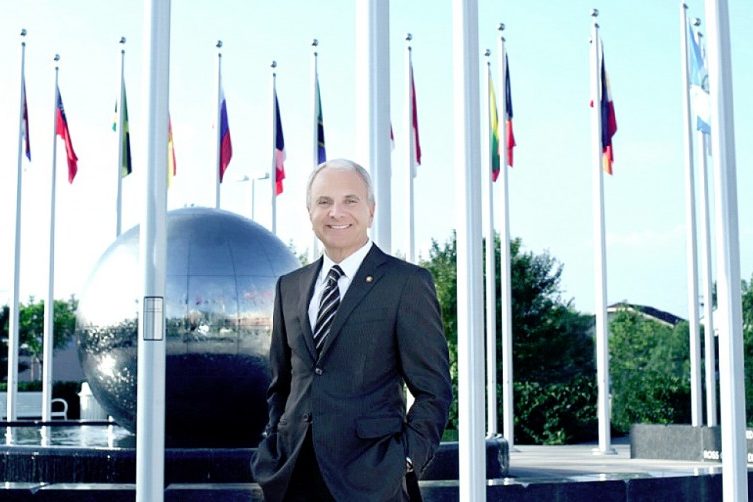An exclusive performance of classically trained Maestro Gabriele Ciampi conducting his CentOrchestra was held at the Italian Cultural Institute on Thursday, June 5, under the auspices of the Consulate General of Italy in Los Angeles. Featuring an 18 piece orchestra and 3 soloists from Santa Cecilia Academy in Rome, the concert presented Gabriele Ciampi’s new album The Minimalist Evolution in “an emotional music crescendo.”
The fruitful collaboration between Gabriele Ciampi Production and the IIC started one year ago, with the aim of promoting not only the greatest and well-known Italian music tradition, but also the new generation of talented composers and conductors who are now entering the international scene.
In a few words, Maestro Ciampi explained us his long-standing passion and his personal approach to music.
How did your passion for music and composition come about?
It started many years ago, when I entered the Conservatory in Rome to study Composition. Afterwards, I worked in the family business (piano sales and distribution) for some time, before moving to Los Angeles in 2011 to attend the UCLA. Composing and conducting my own music has always been my greatest passion: I am a composer who also conducts his own music and his own orchestra, so I am involved 100%.
Where do you usually draw inspiration from?
Creating music is an extremely complicated process, sometimes it takes several weeks. The greatest emotions in life are those you experience firsthand and translate into music. They can be either positive or negative, and from them you draw melodies and harmonies. For this reason, I firmly believe that music can’t be composed by using a computer instead of paper, pencil, and a piano. Technology serves progress but, in my opinion, art still is and will always be connected to an ancient yet unforgettable tradition from the past.
Here in LA, many composers use computers to create their music and film scores, while I think we should look at the past in order to leave our message to the future. The best contemporary composers make history thanks to the “old-school” emotions that they are able to convey and that could never be replaced by a machine. I see a clear difference between working as a “computer-composer” and being a composer, which implies an intensive and lifelong study.
Which is the point of strength of your music?
My goal is to create strong emotions, even if the last only for a few seconds. This is the reason why I compose: to express myself but also to touch the heart of the audience. If a piece doesn’t arouse any emotions it becomes a mere combination of notes.
What is the achievement your are most proud of?
The Senate of the Italian Republic honored me with the medal for “Italian Excellence” for my compositions, and being an Italian citizen this represents the most important recognition of my work. But I must also say that the U.S. Government supported as well me by granting me the Green Card for “Extraordinary Abilities”, another very important recognition.
What does the title of your new album mean?
Minimalist music, and in particular post-minimalist music, is part of the history of world music. All of my compositions are based on this assumption through the use of few, but powerful notes. All the instruments in my orchestra play as soloists. The use of guitars is something new in this music genre, and I really like the dialog between these modern instruments and the classical/contemporary orchestral tradition.
How did you structure the concert at the IIC?
The program included many variations, from Serenata in F Maj for soloist piano to Sonata n.1 per violoncello in C# min, a classical Sonata reinterpreted in a contemporary tone and performed by Livia De Romanis from the prestigious Santa Cecilia Academy in Rome.
Sestetto per piano e fiati – a very rare combination of instruments – was a premiere, while Romanza per violino, performed by first violin Valentina Cellitti, was a homage to the past and to classical romances.
Suite per chitarre e orchestra was a dialog between acoustic and classical guitars and the traditional orchestra, while the grand finale involved the whole orchestra in Concerto per pianoforte e orchestra, performed by Stefania Argentieri.
Why did you move to LA? And what is your relationship with the city and the local Italian American community?
For a few years I had abandoned music and composition, then my fiancée Christine suggested me to go back to them, and Los Angeles is certainly a good springboard. I like the idea of bringing the Italian tradition to California, but at the same time I am glad of what I have learned from the American school: this balance between tradition and modernity should be the foundation of all classical/contemporary compositions.
Is there any advice you would give to young composers?
The passion for music and composing is a natural instinct. I would like young composers to understand the importance of attending an intensive and complete cycle of studies at the conservatory, as composing is not aimed just at making money but at communicating. If you don’t have anything to say you should probably do something else. Most importantly, I would like them to believe in music and never give up, to persevere in studying and never rush into things. Good music education requires many years of study.






























